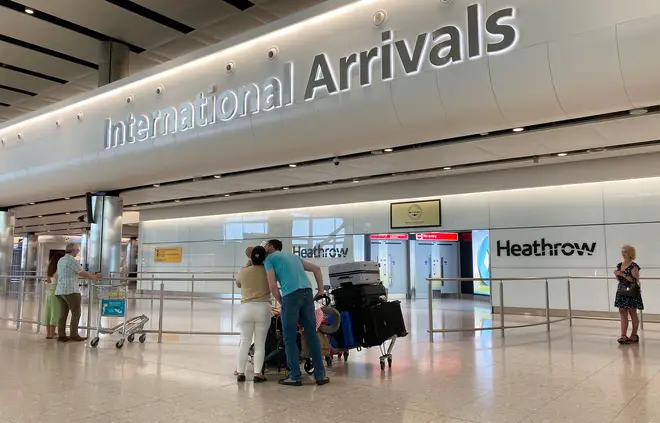
Ben Kentish 10pm - 1am
8 June 2020, 11:01

With the news the Government have brought in quarantine for travellers coming into the UK from abroad many people are asking what do they do if they have to travel to the UK?
From Monday, June 8 all passengers coming into the UK will be required to comply with new Government measures brought in to prevent a second wave of coronavirus cases.
Travellers will need to self-isolate for 14 days under the latest Government measure to reduce the spread of coronavirus.
But many people are confused about the new rules, and what measures they will have to take if they fly into the UK.
With the summer holiday season coming up, and business travel starting to resume many people are asking how the quarantine will impact on them.
Read more: Two-week 'ineffective' quarantine for UK arrivals comes into force
Listen & subscribe: Global Player | Apple Podcasts | Google Podcasts | Spotify
Read more: Coronavirus quarantine could put 25,000 jobs at risk, Heathrow boss warns
Laws have come into force in England, Scotland and Wales, with similar legislation expected in Northern Ireland.
According to The Health Protection (Coronavirus, International Travel) (England) Regulations 2020, travellers to the country will be expected to fill out a form online on gov.uk up to 48 hours in advance of travel, providing contact information, travel details and an address of where they plan to self-isolate once they arrive in the country.
Most travellers will be expected to fill out the form in advance but facilities will be provided at the border for those who have been unable to do so.
For anyone who has not filled out the form, they will be given one last opportunity as they arrive to do so.
Failure to do that will result in an offence and they could be issued with a fine.
Officials will expect airlines and other carriers to check whether people have filled out forms in advance but they will not be required to turn people away from travelling if that has not happened.
The offence will occur when someone has arrived in the UK and failed to fill out the form.
Personal details cannot be used for any reason other than in conjunction with these laws.
The law also appears to suggest information provided by passengers cannot be used in criminal proceedings against them unless they relate to breaches of the quarantine regulations.

Priti Patel tells parliament 14-day coronavirus quarantine 'essential' on UK arrivals
Travellers are urged to use cars or other forms of private transport to travel from the airport when they arrive in the UK but if they must use public transport, they are advised to take the most direct route possible to their accommodation and follow guidance such as wearing face coverings.
UK travellers can go back to their home and self-isolate there.
But people can also isolate in the home of a friend or relative, a hotel, hostel, bed and breakfast, or "other suitable" accommodation.
More than one address can be provided if a "legal obligation" requires a person to change addresses, or it is necessary for them to stay overnight on their arrival in England before "travelling directly to another address at which they will be self-isolating".
Anyone who cannot provide a suitable address will be provided accommodation by the Government, such as a hotel.
Friends and family will not need to isolate with the people who have arrived unless they have also travelled. But they should avoid contact with anyone they are staying with and minimise time spent in shared areas and use separate bathrooms if possible.

"Questions need to be asked" over UK airport quarantine measures
Laws in England warn you could be fined £100 for not filling out the form, doubling for each offence up to a maximum of £3,200, while devolved nations are setting out their own enforcement plans.
Breaching the self-isolation stipulation would result in a £1,000 fine and could lead to prosecution and then a potentially unlimited fine.
Travellers could even be deported, although authorities in Scotland, Wales and Northern Ireland are deciding separately on immigration policy.

Heathrow CEO warns of huge job losses over 14-day quarantine plan
Spot checks are set to be carried out by officials, such as Border Force officers, as travellers arrive at airports and ports to make sure they have filled out the forms, according to the Home Office.
In extreme circumstances, Border Force officers could refuse entry to any non-British citizen or non-British resident who has decided not to fill in the form or not take part in the self-isolation period.
The Government has also threatened to carry out spot checks around the country to make sure people are complying.
In the first instance public health authorities, using private contractors, will phone people and question them to establish whether they are self-isolating.
If there is concern they are not complying, they could be reported to police.
There is even a risk travellers could face questions from officials as they try to leave the country again if they could not be tracked down during the self-isolation period.
A list of exemptions has been published, including road haulage and freight workers; medical professionals travelling to help the coronavirus effort; anyone moving from within the common travel area covering Ireland, the Channel Islands and the Isle of Man; and seasonal agricultural workers who will self-isolate on the property where they are working.
So far no exemptions have been made for elite athletes.
The rules will be reviewed every three weeks, so will be in place until at least June 29, but could last as long as a year, when the legislation expires.
Officials have said until such time as the Foreign Office lifts the advice against all but essential travel, holidaymakers should take that into account and bear in mind implications for their trip and any conditions on their holiday insurance.